Your typical RV toilet significantly varies from your residential toilet. In addition to the obvious variations, such as water use and plumbing, RV toilets are made from various materials. Besides material variations, there are several items to avoid as well as some methods to integrate into your daily cleaning.
Table of Contents
How to Clean RV Toilet? (Quickly & Easily!)
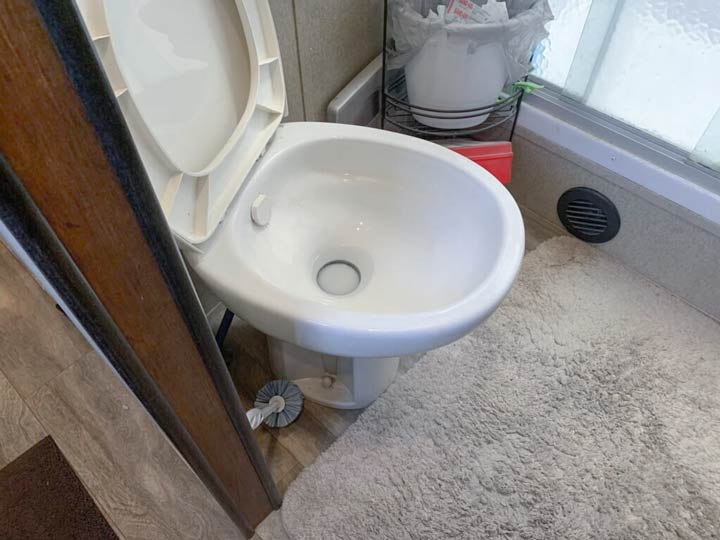
Step 1: Pick the Right Cleaning Material
It is useful to know the distinctions among toilet-cleaning items, as it can have more impact rather than how you clean RV toilets. In general, all toilet cleaners could be divided generally into two groups specific to RVs: safe and chemical.
- Safe Cleaners
If we use the word “safe” when talking about toilet bowl chemicals, we mean the danger that the cleaner may present to humans, animals, and the environment. There are plenty of brands that match these criteria in contexts of residential toilet bowl cleaning products. For example, mineral cleaning products are often very healthy and do a pretty good job of maintaining your bathroom and toilet clean.
Regrettably, the large number of such cleaning products are not manufactured specifically for campers and can harm the fragile plastic or porcelain of your toilet bowl. Fortunately, there are still certain cleaning products out there that might work just fine in your RV. It is important to use RV toilet cleaning products that are viewed as a safe product specifically designed for RVers. They will decompose mineral resources and human waste within your toilet bowl with bacterial cleaning products.
- RV Toilet Chemical Cleaners
When we speak of chemical cleaning products, we are speaking about chlorine or toilet bowl cleaning products based on bleach. Typically these groups of cleaning products work well to eliminate waste in your RV toilet. The most common items that accumulate in your toilet are mineral contaminants such as water staining and traces of human waste. That said, while chlorine and bleach cleaning products can be efficient, this does not guarantee they are safe.
They can contain harmful chemicals that have negative effects on your raw sewage holding reservoir, destroy all the good bacteria in your reservoir, and cause catastrophic backups and clogs. That is why you must avoid chemical toilet cleaning products completely.
Step 2: Pick the Right Cleaning Tool
If you’re a plastic toilet bowl in your RV, you should try to avoid using the regular plastic brush. A lot of RV owners make a big mistake using a stiff brush and end up with grooves and large scratches throughout their toilet bowl. Not only that this will damage your toilet bowl, but that will also make cleaning more difficult, as mineral deposits and human waste may accumulate in these grooves.
To prevent scratching your RV toilet try using a suitable sponge to scrub the surface of your RVs toilet bowl. These can be found very easily everywhere you can buy dish cleaning products. A lot of sponges have a durable exterior to make surface stains easy to clean.
Besides, effective surface washing sponges efficiently disinfect your RV toilet without damaging its surface, making it the best choice as your cleaning tool. If you would like the convenience given by the extended brush, there are a lot of cleaning brushes that use a sponge at the ends of the handle instead of a scrubbing brush.
How to Clean RV Toilet – Step by Step Guide
To keep your toilet as much fresh as possible, you need to wash your RV toilet regularly and properly. Here you can find a step-by-step guide on how to clean your RV toilet:
- Add a small quantity of water and distribute it out with a sponge throughout the toilet bowl.
- Apply equally the safe cleaning product within the RV toilet bowl.
- Clean the toilet bowl thoroughly with a sponge.
- Allow 5 minutes for the cleaning product to stay. That gives the cleaning product more than enough time to begin disintegrating the mineral build-ups and residues in your RV toilet bowl. It is essential not to permit the microorganisms to dry out, so don’t let the cleaning product stay too long.
- Flush the toilet and clean thoroughly. Flushing the cleaning product into your water reservoir will enhance the process of waste disintegration in your storage tank.
You might need to clean your RV toilet several times to eliminate difficult water spots, so you will need to take some time with buildups.
Tips for Maintaining RV Toilets
Ensuring that your RV is well maintained and taken care of is a key element of your RV ownership. By ignoring your RV septic structure, you expose yourself to several complicated problems which could easily be minimized.
A common problem that many people encounter is a misreading of their storage containers. These sensors are sensitive, and if the sensors continue to read that they are full, even though you’ve cleaned them, likely some of the residues remain on the sensor. A fast and easy way to “activate” these detectors is simply to put some ice trays inside your RV toilet.
Reservoir treatment should be a must whenever it comes to maintenance of the RV toilet. Such treatments help to remove toilet paper and waste and enable the rinsing of cleaner products while draining your tank out. Everyone who does own an RV must use treatments and air fresheners regularly to extend the life of their septic facility.
Almost all RV toilets today arrive with a sprayer connected to be used on your toilet bowl whenever the flush isn’t strong enough. However, if you still have an older type of toilet, hold a plastic cup next to your RV toilet and use it while you flush.
The material of the toilet paper you use can strongly affect your RV septic system. By ensuring that the toilet paper you pour down your toilet is suitable for RV, you substantially lower the risk of having a clogged or damaged septic system.
Conclusion
There are many variations among your RV toilet and residential toilet, so it’s important to choose a toilet bowl cleaning product specifically made for your RV. It is also important to use a safe RV toilet cleaning products along with a storage tank treatment. That way, you will not reduce the beneficial benefits of your RV septic system. Also, do not use intense brushes that could damage your RV toilet bowl.
FAQ
1. Can I Use Bleach to Clean My RV Toilet?
Ans. Don’t just use bleach oriented cleaning products because these chemicals will damage your waste reservoir that is attached to the RV toilet. Also, do not combine chemicals and dispose of them inside the RV toilet. That could cause the formation of methane gas in the waste reservoir and could lead to an explosion.
2. Can I Use Vinegar to Clean My RV Toilet?
Ans. Vinegar can easily clean your RV toilet, but ensure that you are using white distilled vinegar. Apple cider vinegar will indeed focus on cleaning, but it could stain your RV toilet with a brownish color.
3. Can You Use Drano in RV?
Ans. Do not use caustic drain cleaning products such as standard Drano, as they can destroy your valves. Choose drain cleaning products instead, which use liquid biological enzymes that break down the waste deposits.
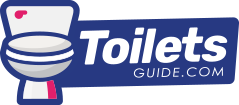
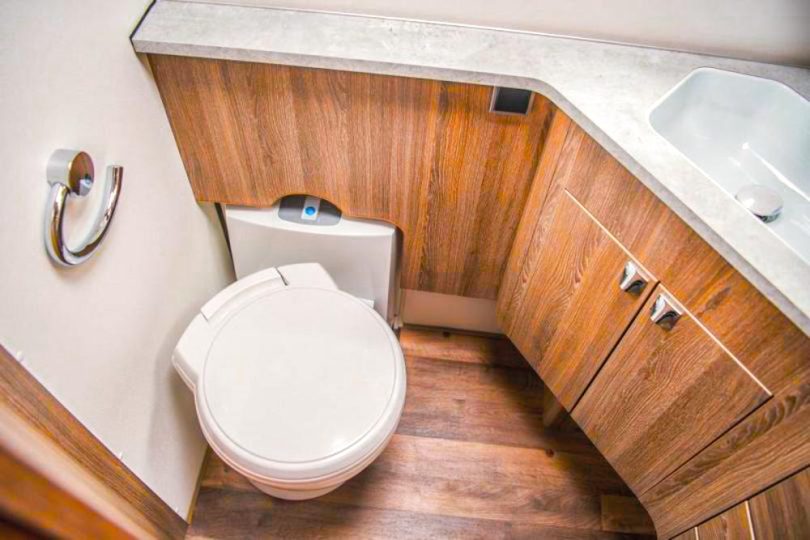
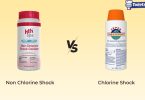

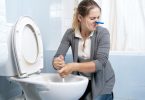
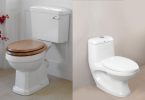
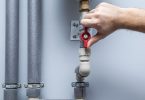
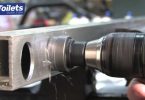
Leave a Comment